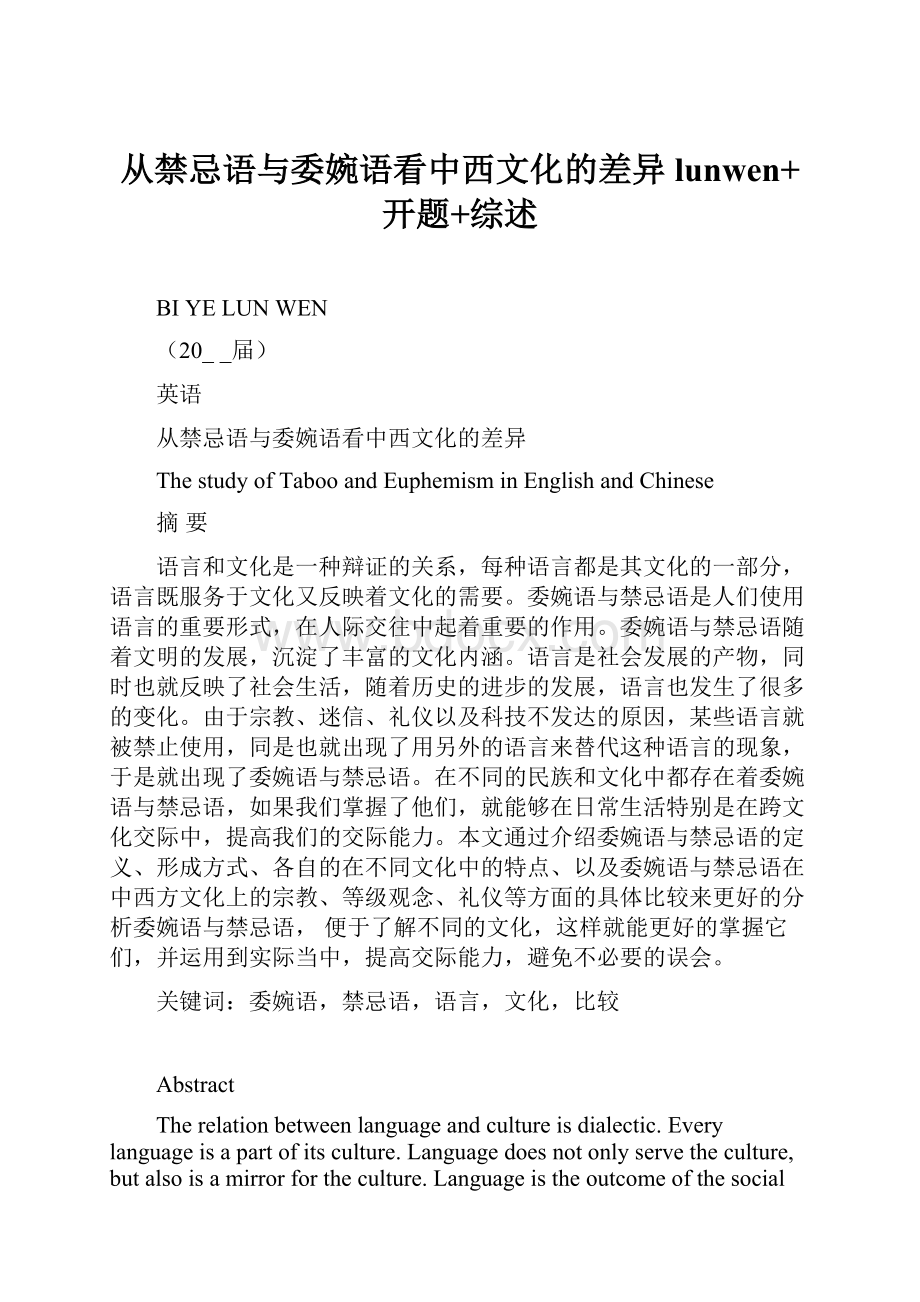从禁忌语与委婉语看中西文化的差异lunwen+开题+综述.docx
《从禁忌语与委婉语看中西文化的差异lunwen+开题+综述.docx》由会员分享,可在线阅读,更多相关《从禁忌语与委婉语看中西文化的差异lunwen+开题+综述.docx(27页珍藏版)》请在冰豆网上搜索。

从禁忌语与委婉语看中西文化的差异lunwen+开题+综述
BIYELUNWEN
(20__届)
英语
从禁忌语与委婉语看中西文化的差异
ThestudyofTabooandEuphemisminEnglishandChinese
摘要
语言和文化是一种辩证的关系,每种语言都是其文化的一部分,语言既服务于文化又反映着文化的需要。
委婉语与禁忌语是人们使用语言的重要形式,在人际交往中起着重要的作用。
委婉语与禁忌语随着文明的发展,沉淀了丰富的文化内涵。
语言是社会发展的产物,同时也就反映了社会生活,随着历史的进步的发展,语言也发生了很多的变化。
由于宗教、迷信、礼仪以及科技不发达的原因,某些语言就被禁止使用,同是也就出现了用另外的语言来替代这种语言的现象,于是就出现了委婉语与禁忌语。
在不同的民族和文化中都存在着委婉语与禁忌语,如果我们掌握了他们,就能够在日常生活特别是在跨文化交际中,提高我们的交际能力。
本文通过介绍委婉语与禁忌语的定义、形成方式、各自的在不同文化中的特点、以及委婉语与禁忌语在中西方文化上的宗教、等级观念、礼仪等方面的具体比较来更好的分析委婉语与禁忌语,便于了解不同的文化,这样就能更好的掌握它们,并运用到实际当中,提高交际能力,避免不必要的误会。
关键词:
委婉语,禁忌语,语言,文化,比较
Abstract
Therelationbetweenlanguageandcultureisdialectic.Everylanguageisapartofitsculture.Languagedoesnotonlyservetheculture,butalsoisamirrorfortheculture.Languageistheoutcomeofthesocialdevelopment,anditalsoreflectsthesociety.Withthedevelopmentofthehistory,wehaveseenalotofchangesaboutlanguage.TabooandEuphemismaretheimportantformsinoursociety.Andtheyalsoplayanimportantroleininterpersonalinteraction.Withthedevelopmentofthecivilization,TabooandEuphemismhavealsoaffectedandenrichedtheculture.Becauseofthebackwardnessofreligions,superstitions,etiquettes,andtechnologies,apartofthelanguageisnotallowedtouse,inthesametime,someotherwordscameupandreplacedthesewordswhicharenotallowedtobeused.Then,TabooandEuphemismarecreatedinourdailylife.
Keywords:
Taboo,Euphemism,language,culture,comparison
Contents
Abstract……………………………………………………………………………Ⅱ
1Introduction--------------------------------------------------------------------------------10
2OriginandDefinitionoftabooandeuphemism------------------------------------10
2.1OriginandDefinitionoftaboo----------------------------------------------------------10
2.2OriginandDefinitionofeuphemism--------------------------------------------------11
2.3sampleanalysis---------------------------------------------------------------------------11
3FeatureofeuphemismandtabooinChineseandEnglish------------------------12
3.1Thelanguagefeaturesofeuphemism--------------------------------------------------12
3.1.1Nationality------------------------------------------------------------------------------12
3.1.2Locality----------------------------------------------------------------------------------12
3.1.3Relevance-------------------------------------------------------------------------------12
3.1.4IndirectionandRelativity-----------------------------------------------------------13
3.1.5Fuzziness------------------------------------------------------------------------------13
3.1.6Humor---------------------------------------------------------------------------------13
3.2Thelanguagefeaturesoftaboo---------------------------------------------------14
3.2.1Universality--------------------------------------------------------------------------14
3.2.2Nationality---------------------------------------------------------------------------14
3.2.3Relevance----------------------------------------------------------------------------14
3.2.4Description---------------------------------------------------------------------------15
3.2.5Classnature--------------------------------------------------------------------------15
3.2.6Implicitness--------------------------------------------------------------------------15
4ThreeFormationsofEuphemismandtaboo------------------------------------15
4.1FormationofTaboo-------------------------------------------------------------------16
4.1.1Profanities---------------------------------------------------------------------------16
4.1.2Obscenities--------------------------------------------------------------------------16
4.1.3Vulgarities---------------------------------------------------------------------------17
4.1.4Sensitivetopics---------------------------------------------------------------------17
4.2PrinciplesoftheFormationofEuphemism---------------------------------------17
4.2.1Remoteness-------------------------------------------------------------------------17
4.2.2Pleasantness------------------------------------------------------------------------18
4.2.3Relatedness-----------------------------------------------------------------------18
5ThedifferenceinTabooandEuphemismbetweenChineseandEnglish-19
5.1BackgroundofChinaandWesterncountries.-----------------------------------19
5.2TheapplicationandcomparisonbetweenChineseandEnglishintabooandeuphemism.------------------------------------------------------------------------------20
5.3ThedifferencebetweenChineseandEnglishintabooandeuphemism------21
5.3.1Thetabooandeuphemisminreligion------------------------------------------21
5.3.2Thetabooandeuphemisminsenseofgrade---------------------------------22
5.3.3Thetabooandeuphemisminetiquette----------------------------------------22
6Conclusions---------------------------------------------------------------------------23
7Bibliographies------------------------------------------------------------------------24
8Acknowledgments---------------------------------------------------------------------25
1Introduction
Language,asatoolofcommunication,throughthecrucialrolethatlanguageplaysintheorganizationofsocialgroup,hasastrongconnectionwithcultureandsociety.TabooandEuphemism,beingpartofthelanguage,havealonghistoryinChineseandEnglish.However,theircreationhastheiruniquereasons,andtheirusage,scopeofapplicationarealsodifferent.
2OriginandDefinitionoftabooandeuphemism
2.1OriginandDefinitionoftaboo
ThetermtabooisofPolynesianorigin-“tabu”onTonganArchipelagoes.ItoriginallyreferstothoseholyfactsorobjectswhichcannotbespokenortouchedandfirstnotedbyCaptainJamesCook,aBritishsailor.Thereisalsoastory.DuringCook’svisittoTonganin1771,whenhecametotheislandinSouthPacific,hefoundmanystrangephenomena.Forexample,someobjectscanonlybeusedbytheirleadersorbytheGod,butsomecanonlybeusedbycommonpeople,andsomeobjectscanonlybeusedforspecialpurpose,butsomeonlyforgeneraluse.Thelocalpeoplecalledthesephenomena“tabu”,whichmeans“tobeholyanduntouchable”.CookintroducedthistermintotheEnglishlanguage,andspelleditas“taboo”inEnglish.TaboohashighlydevelopedinPolynesiansocietyofSouthPacific,buttheyemergedfromthemanycultures,bothinChineseandEnglish.Therefore,theword“taboo”,asaspecialnounforthiskindofspecialphenomenon,wasbroughttosociologyandanthropology.Itisinterpretedasonewayinwhichasocietyexpresseditsdisapprovalofcertainkindsofbehaviorwhichareconsideredharmfultosomeoneeitherforsupernaturalreasonsorsuchbehaviorthatwillviolateamoralcode.Thereisnogenerallyacceptedexplanationoftaboountillnow,butthereisbroadagreementthatthetabooscurrentinanysocietytendtobecomeprohibitions,excludingsomethingfromuse,approach,ormentionbecauseoftheirsacredandinviolablenature,orbansorinhibitionresultingfromsocialcustomoremotionalaversion.
Therearetwoaspectsoftaboo:
oneistheobjects,whichshouldberespected,butcannotbeusedfreely;theotherisobjects,whichcannotbetouchedfreely.Inabroadersense,tabooexistsinallknowncultures,referringtocertainacts,objectsorrelationshipwhichthesocietywishestoavoidandthelanguageusedtotalkaboutthem.Inotherwords,tabooconsistsofBehavioralTabooandVerbalTaboo.Generallyspeaking,BehavioralTaboocausedVerbalTaboo.VerbalTabooindicates“atotalorpartialprohibitionoftheuseofcertainwords,expressionandtopicsinsocialinteraction.”
2.2OriginandDefinitionofeuphemism
Theword“euphemism”wasderivedfromtheGreekword“euphemismos”,whichmeans“fairspeech”.Theprefix“eu”means“good,soundwell”and“pheme”means“saying”or“speech”.Andthustheliteralmeaningof“euphemism”is“tospeakwithgoodwordsorinapleasantmanner”.Thatistosay,euphemismisusedasanalternativetounpleasantexpression,inordertoavoidpossiblylosingsomeone’sface,orone’sownface,orthroughgoingoffense,thatoftheaudience,orsomeofthirdofparty.Thisunpleasantexpressionmaybetabooed,fearsome,orforsomeotherreasonsthatspeakerscan’torintendnottousesomecertainexpressiondirectlyonsomeoccasion.“InWebster’sEncyclopedicUnabridgedDictionaryoftheEnglishLanguageis‘thesubstitutionofamild,indirect,orvagueexpressionforonethoughtsubstituted’.RawsonBlunt,aBritishwriter,definedeuphemismas‘agoodfavorableinterpretationofabadword.”“EncyclopediaBritannica(1994)alsodefineseuphemismas‘afigureofspeechinwhichsomethingofanunpleasant,distressingorindelicatenatureisdescribedinlessoffensiveterms’”.
2.3sampleanalysis
FortheEnglishlearner,understandingthetabooandeuphemismisveryimportant;therearesomeexamplesbothinChineseandEnglish.
InChinese,especiallyinsex,Chineselanguagehasbeenaffectedbythefeudalismforalongtime.PeopleinChinaarenotallowedtosaysomewordsinexcretion.Forexample,peopleareavoidedtotalkaboutdefecationwhenhavetheirdinner.Chinesepeopledonotsay“somebodyisdead”,theyalwaysusethewordsjustlike“somebodyhasgoneorsomebodyistooold”.InEnglish,peoplealsodonotusethewords“cancer”,theycallit“thebigc”or“longillness”,butinChinese,peoplesaytheillnesscannottobecured.InEnglish,peoplealsousesomesentencestoreplacetheword“menstruation”,justlike“I’mhavin